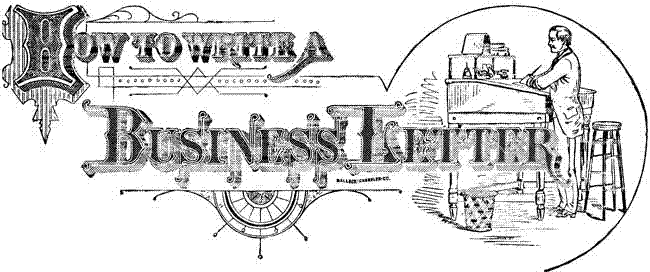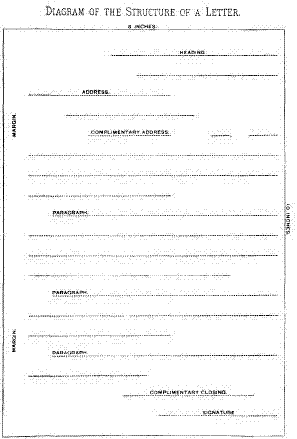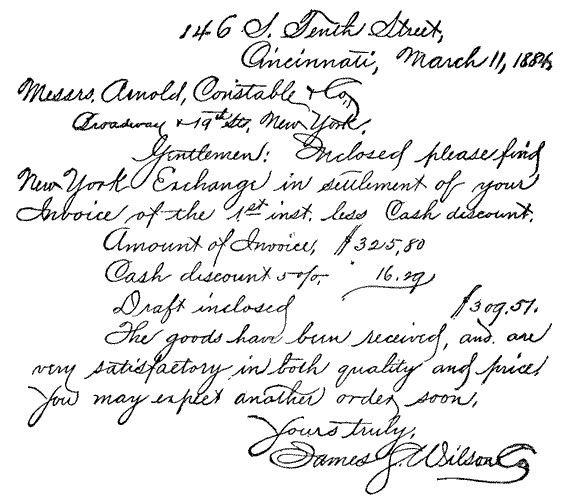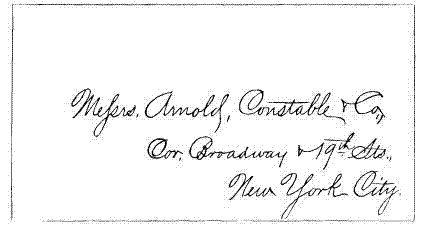 |
 |
|
|
|
|

HOW TO WRITE A BUSINESS LETTERConsidering the vast amount of business transacted by correspondence between the parties, Letter Writing seems only second in importance to bookkeeping. The merchant of the smaller cities or towns, perhaps in the far west, desires to order articles of merchandise from the wholesale house in New York or Boston. Possibly a remittance is to be sent. It may be that an error has occurred and needs correction. Credit is to be asked, references given, and a multitude of other matters call for adjustment through correspondence. To write every conceivable variety and shade of meaning, expressing the proper thought in the most fitting and appropriate language, is indeed a rare and valuable accomplishment. And when the proper language takes on the graceful and businesslike air of the well written letter, with its several parts harmoniously arranged, it is a combination of brain and skill which can hardly be overestimated. This subject, therefore, naturally divides itself into two parts: The Mechanical Structure, and the Literature of a Letter. The former of these being the less difficult will be first considered. 
THE STRUCTURE OF A BUSINESS LETTER.
Consists in the arrangement of its several parts, with a view to the most harmonious effect. Excellent penmanship is very desirable, but not absolutely essential. The penmanship may indeed be poor, but the arrangement of the several parts of the letter, the neatness, and finish, may be such as to give it an attractive appearance, while on the other hand, the letter may be clothed in the most elegant penmanship, and yet the construction be such as to stamp its author as a careless and indifferent person, devoid of precision and order. No one great thing, but many little things carefully watched, and attentively practiced, make up the structure and dress of a business letter, and give it a businesslike air. The penmanship should be a neat, strong hand, very plain and legible, and devoid of all flourish. PAPER AND ENVELOPE.The paper and envelopes used in business correspondence should be of a good, durable quality, and a white color is preferable. Cheap materials are not only unsatisfactory to the writer, but may give the reader an unfavorable impression, which would be an injury far exceeding the cost of the best stationery for a life time. Persons form impressions from very little things sometimes. The size of a letter sheet in business correspondence should be about 8x10 inches. This sheet affords a sufficient space for a communication of ordinary length to be written on one side only, which is essential in case the letter is copied in a letter press. A sheet of paper, note size, (5x8) is oftentimes used for brief communications of no special importance, and not designed to be filed for future reference. Among professional men the commercial note sheet is more extensively used, but with business men the letter size is considered preferable. The envelope should correspond in size to that of the letter sheet, and should be a trifle longer than one-half the length of the sheet. Thus in a sheet eight by ten inches, one-half the length of the sheet is five inches, and this requires the length of the envelope to be about five and a quarter inches. Its width is usually about three inches. Avoid the use of fancy colored and fancy shaped paper and envelopes. These may not be objectionable in social correspondence among ladies, but the gravity of business affairs does not admit of such display. THE HEADING. Chas. A Roberts ; ; ;Wm. J. Dennis Office of ROBERT & DENNIS DEALERS IN FANCY AND STAPLE GROCERIES, 320 Jefferson Street, Burlington, Va.,______________ 18____ With most firms engaged in business it has become a custom to have the business advertisement placed at the head of the letter page, together with street, number and city. Thus leaving only the date to be inserted to complete the heading. In case the heading of the letter is to be entirely written, it should be placed so as to occupy the right hand half of the first two lines at the top of the page. If, however, the letter is to be a very brief one, occupying only three or four lines, the heading may then be placed lower down on the sheet, so as to bring the body of the letter about the center of the sheet. Writing from a large city the heading should contain the street and number. Your correspondent, in directing his answer will rely on the address given in the heading of your letter. Never be guilty of the blunder committed by ignorant persons of placing a part of the heading under the signature.  765 Market Street, Philadelphia, June 10, 1882. The second line of the heading should begin a little farther to the right than the first line, as seen above. If the writer has a box at the Post Office and wishes his mail delivered there, he may head his letter, as on the following page:  P.O. Box 3657, New York, May 16, 1882. Writing from the principal cities of the United States it is not necessary to make the name of the state a part of the heading, as that is supposed to be known and understood, but with smaller cities the name of the state also, should be given. Thus, there is a Quincy in Illinois, and also in Massachusetts, and unless the state were mentioned a person answering a letter from Quincy, would not know which state to direct his reply to. In writing from an obscure town or village, not only the state should be given, but the county as well.  Ottawa, La Salle County, Ill., December 20, 1882. The punctuation of the heading and other parts of the letter, is of great importance in the estimation of cultivated persons, and something which can be learned by a little attention on the part of anyone, in examining the forms here given. MARGIN.A margin three-quarters of an inch in width should be left, on the side of the letter, as shown in the diagram. This is convenient for any mark or memorandum which your correspondent may desire to make concerning anything contained in the letter, but its greater value lies in the open, airy, and cheerful dress which it imparts to the letter. A margin too narrow conveys the idea of stinginess, as if to economize paper, while an irregular or zigzag margin conveys the idea of carelessness or want of precision. On a sheet of note paper the margin may be only one-half inch in width, thus making its width proportionate to the size of the sheet. ADDRESS.On the next line below the heading, that is the third line from the top of the sheet, and beginning at the left margin, should be placed the Address, which consists of the name of the person to whom the letter is written, together with his titles, if any, and his place of residence or business. The letter is not complete without all this, in the estimation of the business man. It does not fully explain itself, if the place of residence is not down as well as the name, and in preserving a letter press copy, this is quite essential for future reference.  Messrs. Samuel Bliss Co. Reading, Pa. Gentlemen: Or if the letter is written to a person living or doing business in a large city, thus: 
Mr. James M. Cummings 645 Broadway, New York. Sir: The names and residence should not be allowed to extend further to the right than about the center of the sheet, thus leaving an open space between this and the heading of your letter. In case the names or place of residence should be so long as to require it, they may be placed thus:  Messrs. Richards, Shaw, Fitch & Winslow, Chicago. Gentlemen: The words Dear Sir or Gentlemen are sometimes placed farther to the left, as in the above example, but most business men in their correspondence place this complimentary address with reference to the words above them, about three-quarters of an inch farther to the right, as shown below.  William D. Nelsen, Esq., 177 Erie St., Boston, Dear Sir: The custom of placing the address beneath the body instead of at the beginning of the letter, is not much in vogue in business circles in this country, most business men preferring to place the name and address at the head of the sheet, and then write at it as if they were talking to the person himself. When, however, the address is placed below the letter it should occupy the same position as to the margin, etc., as if placed at the beginning. The custom is borrowed from the English, and its use is confined mostly to government officials and professional men. BODY OF THE LETTER.This constitutes the written message. It should begin on the same line with the words Dear Sir, or leaving after these words a small space. In case the place of residence or business is not written in the address, then the complimentary address of Dear Sir or Gentlemen will be placed on the next line under the name, or fourth line from the top of the sheet, and the letter will begin on the fifth line from the top, thus:  Mr. Henry L. Dunham, Dear Sir: In answer to your esteemed favor Sometimes for the sake of convenience, and the saving of time and labor, the letter head has printed in the left corner, above the address, a blank form of memorandum as follows:
and after this introduction the writer is able speedily to get at the marrow of his letter, without acknowledging the receipt of a former communication. The body of the letter should be divided into as many paragraphs as there are distinct subjects in the letter, or a new paragraph should be commenced at every change of the subject. The habit which some persons have of tacking one subject to the end of another, and thus making a letter one continuous paragraph of mixed up information, instructions and requests, is extremely objectionable. It destroys the force of what is said, instead of fixing each thought clearly on the mind of the reader; it leaves him confused, and he reads a second time and tries to get his ideas fixed and systematized, or he throws aside the letter until he has more time in which to study it and get the meaning clear. If the letter is long and is really concerning only one subject, then it may properly be divided into paragraphs by separating the different divisions of the subject, and giving a paragraph to each. These should be arranged in their logical order. Wherever the letter is to contain numerous paragraphs to avoid omitting any of the items, it is best to jot them down on a slip of paper, then embody them in the letter in their natural order. The first word of each paragraph should be indented, or moved in from the margin, usually about the width of the margin. Thus if the margin is three-fourths of an inch in width, the paragraph should begin three-fourths of an inch from the margin. Some writers, however, prefer to commence the first word of the paragraph an inch from the margin, and it is really not so essential what the distance is, as that it should be uniform, and all the paragraphs begin alike. A little attention is necessary here. In ordering goods make each article a separate paragraph. COMPLIMENTARY CLOSING AND SIGNATURE.The complimentary closing consists of such words as Yours truly, Respectfully, etc., and should be placed on the next line beneath the last one occupied by the body of the letter, commencing a little to the right of the middle. The signature should be placed underneath the words of respect, and begin still a little farther to the right. Thus the conclusion of the letter will correspond in position and arrangement with the heading.  Yours truly, John Maynard. The language of the complimentary closing should be governed by the relation between the parties, and should correspond with the complimentary address. The first letter between strangers should commence with Sir and end with the word Respectfully. After the exchange of a few letters and a sort of business acquaintance may be said to exist between the correspondents,then Dear Sir, and Yours truly, may properly be introduced. A little more cordial would be such a conclusion as the following:  Yours very truly, Rinold, Constable & Co. The man of business is apt, however, to have one stereotyped beginning and ending to all his letters, and seldom stops to discriminate between strangers and old customers in this respect. Often the conclusion may be connected to the closing paragraph with perfect grace and ease thus:  Hoping to receive the goods without delay, I remain, Respectfully, Henry P. Bowen. In the signature of a letter, especial care should be exercised. Bear in mind that names of persons are not governed by the rules of spelling, and words which precede or follow, proper names will not aid us in deciphering them if they are poorly written.  A Model Business Letter 146 S. Tenth Street, Cincinnati, March 11, 1884, Messrs. Arnold, Constable & Co., Broadway & 19th Sts, New York. Gentlemen: Inclosed please find New York Exchange in settlement of your Invoice of the 1st inst. less Cash discount. Amount of Invoice, $325.80 Cash discount 5% 16.29 ——— Draft inclosed $309.51 The goods have been received, and are very satisfactory in both quality and price. You may expect another order soon. Yours truly, James Z. Wilson Co. The young person who would learn to write a good business letter, should, with pen, ink and suitable paper, sit down and practice faithfully after the above model. Write and re-write it a dozen times or more, until your letter resembles it closely. Then take any of the models for letters given near the close of this chapter, and with this matter, write a letter which will conform with the foregoing model in appearance and dress. Write the same matter over again, and improve it in its defects. Criticise each line and word. See that no words or letters are omitted, and that the punctuation is according to the models in this book. Eliminate all ungainly letters, shorten the loops, see that each letter rests on the line, and that, withal your page is clean and regular. The person who will thus devote a little earnest study and practice, may early acquire the valuable accomplishment of writing a pleasing business letter, so far as the mechanical structure goes. ADDRESSING THE ENVELOPE.After the letter is finished, and while it yet lies open before you, the Envelope should be addressed. As before stated, the directions on the envelope must conform to the address at the beginning of the letter, hence the necessity for addressing the envelope before the letter is folded. The first line of the address of the envelope should consist of the name of the person or firm to whom the letter is written, together with any appropriate titles, and should be written across or a little below the middle of the envelope, but never above it, beginning the left edge. The space between this first line and the bottom of the envelope should be about equally divided among the other lines, each of which begins still farther to the right than the one above, thus:  Messrs. Arnold, Constable & Co., Cor. Broadway & 19th Sts., New York City. When writing to a person in a large city the number and street should be a part of the address, and may be placed as in the above form, or in the left hand lower corner as follows:  Lewis H. Taylor, Esq., Chicago, 118 Wabash Ave. Ill. In case the letter is addressed in care of any one this should be placed in the lower left corner. If a letter of introduction, the words Introducing Mr. John Smith, or similar words, should be placed in this corner. Letters addressed to small towns or villages should bear the name of the county as follows:  Mr. Henry D. Chambers, Washington, Porter County, Ala. Or the name of the county may be placed in the lower left corner. The Post Office box number is usually placed in the lower left corner. FOLDING A LETTER.Having written an excellent letter, and faultlessly addressed the envelope, all may be easily stamped as unbusiness-like, and spoiled, by improperly performing so simple a part as the folding. Remember that excellent rule that, whatever is worth doing should be well done. With the letter sheet lying before you, turn the bottom edge up so that it lies along with the top edge, thus making a fold in the middle, which press down with the thumb nail or with a paper folder. Then fold the right edge over so that it falls two-thirds the distance across the sheet, and press down the edge. Next fold the left edge of the sheet over to the right, breaking the fold at the edge of the part folded over just before. In case a check, note, draft, bill or currency is to be sent by letter, it should be placed on the upper half of the sheet as it lies open, and then the letter should be folded the same as if it were not there. This will fold the paper or document in the letter so that it will be difficult to extract it while being transmitted in the mails, and so that it will not be dropped or lost in opening the letter. The letter is now folded so that it will be of equal thickness in every part of the envelope. Insert the last broken or folded edge in the envelope first, with original edges of the sheet at the end of the envelope which the stamp is on; when taken from the envelope the letter will then be proper side up. THE LITERATURE OF A LETTER.To be able to compose a letter requires more ability than to give it the proper arrangement and mechanical dress. A mind well stored with useful knowledge as well as command of language, is necessary in writing a letter on general subjects. The strictly business letter requires a thorough understanding of the facts concerning which the letter is written, and these facts to be set forth in plain and unmistakable language. All display of rhetoric or flourish of words is entirely out of place in the sober, practical letter of business. The proper use of capital letters, punctuation, and correct spelling are essential to the well written letter, and with a little care and striving may be easily acquired. ARRANGEMENT OF ITEMS.As stated before, each item or subject in a letter should be embraced in a separate paragraph. These should be arranged in the order in which they would naturally come, either in point of time, importance, or as regards policy. Never begin a letter abruptly with a complaint, but rather bring in all unpleasant subjects toward the close. If an answer to a letter of inquiry, take up the questions as they are asked, indicate first what the question is, and then state clearly the answer. The first paragraph should acknowledge the receipt of the communication now to be answered, giving date and indicating its nature and contents, thus: Your letter of the 10th instant concerning damaged goods is received, etc. The closing paragraph usually begins with such words as Hoping, Trusting, Awaiting, Thanking, or similar expressions, and is complimentary in its tone and designed as a courtesy. BREVITY.Business letters should be brief and to the point. The best letter states clearly all the facts in the fewest words. Brevity is not inconsistent with a long letter, as so much may need to be said as to require a long letter, but all repetitions, lengthy statements and multiplication of words should be avoided. Use short sentences, and make every word mean something. Short sentences are more forcible, and more easily understood or remembered, than long drawn out utterances. STYLE.Style refers to the tone, air, or manner of expression. Dignity and strength should characterize the style of the business letter. No ornament of expression or eloquence of language is necessary or appropriate in a correspondence between business men. Come to your meaning at once. State the facts. Let every sentence bristle with points. The successful business man must possess energy, decision, and force, and these qualities should be conspicuous in his correspondence in order to command respect. Never use loose or slang expressions. The business man should be a gentleman. Indulge in no display of superior knowledge or education, but temper each paragraph with respect and deference to others. The learner who would aspire to write a good letter, should, after having finished his attempt, go over each sentence carefully and wherever the pronoun I occurs, modify the expression so as to leave this out. ORDERING GOODS.In ordering goods of any kind, care should be used to state very explicitly the color, size, quality, and quantity of the articles desired. If manufactured goods, the name of the manufacturer, or his trade mark or brand should be given. Also state when you desire the goods shipped and in what way. If by freight or express, state what Freight line or Express Company. SENDING MONEY BY LETTER.Paper currency should seldom be trusted to pass through the mails, as the liability to loss is too great. Better send draft or P. O. money order, and in every case the amount of the remittance should be stated in the letter, and also whether by draft or otherwise sent. The letter may become important evidence in regard to payment at some future time. INSTRUCTIONS.In giving instructions to agents, manufacturers and others, let each order occupy a separate paragraph. State in unmistakable language the instructions desired to be conveyed. If possible a diagram or plan should be enclosed in the letter. Cautions and complaints, if any, should be clearly set forth in paragraphs near the close of the letter. A DUNNING LETTER.State when the debt was contracted, its amount, the fact of it having been long past due, the necessity for immediate payment, and any other facts depending on the peculiarities of the case, which it may seem best to make use of, such as promises to pay, which have not been met; the inconvenience as well as injury and distrust caused by such irregularities, etc. LETTERS OF INTRODUCTION.Be just and truthful, avoiding any stereotyped form in letters of introduction. Never give a letter of introduction unless you have entire confidence in the person to whom it is given; it may reflect on your character or be used against you. Be very guarded that no expressions may be construed into a letter of credit, thus making the writer liable for payment. Use no unfounded statements or assertions, over-estimating your friend, as these may prove untrue. Willing to extend a favor to a friend by giving a letter of introduction, do not be guilty of introducing him to any one in whom he may not place confidence, as he might be a loser by such. Form of a Letter Ordering Goods.128 Jackson Street, Messrs. JONES & SMITH, Gentlemen: Please ship me by Fast Freight as soon as possible the following goods: 3 hhds. N. O. Molasses. I will remit the amount of the invoice immediately upon the receipt of the goods. Yours respectfully, JAMES C. ADAMS. Ordering Goods and Enclosing Price.RICHMOND, IND., Dec. 29, 18——. Messrs. MARSHALL FIELD & Co., Gentlemen: Please forward me by American Express at once 1 Lancaster Spread, 3.50 ———— $14.30 For which I inclose P.O. Money order. Hoping to receive the goods without delay, I am, Respectfully, WILLIAM L. MILLER. Desiring to Open an Account.DAYTON, OHIO, Oct. 12, 18——. Messrs. HOLMES & WILSON, Gentlemen: Having recently established myself in the retail Hardware trade in this city, with fair prospects of success, and being in need of new goods from time to time, would like to open an account with your highly respectable house. My capital is small, but I have the satisfaction of knowing that what little I possess is the fruit of my own industry and saving. I can refer you to the well known firm of Smith, Day & Co., of this city, as to my character and standing. Should my reference prove satisfactory, please forward me at once by U.S. Express, 2 Butchers' Bow Saws and charge to my account. Hoping that my order may receive your usual prompt attention, I am, Yours respectfully, HENRY M. BARROWS. Letter of Credit.LEXINGTON, KY., June 25, 18——. Messrs. DODGE, MANOR & DEVOE, Gentlemen: Please allow the bearer of this, Mr. James Curtis, a credit for such goods as he may select, not exceeding One Thousand dollars, and if he does not pay for them, I will. Please notify me in case he buys, of the amount, and when due, and if the account is not settled promptly according to agreement, write me at once. Yours truly, HIRAM DUNCAN. Inclosing an Invoice.125 Lake Street, SAMUEL D. PRENTICE, Esq., Dear Sir: Inclosed please find invoice of goods amounting to $218.60, shipped you this day by the B. & O. Express, as per your order of the 11th inst. Hoping that the goods may prove satisfactory, and that we may be favored with further orders, we remain, Yours truly, SIBLEY, DUDLEY & CO. Letter of Introduction.168 Olive Street, HENRY M. BLISS, Esq., Dear Sir: This will introduce to you the bearer, Mr. William P. Hainline, of this city who visits Boston, for the purpose of engaging in the Hat, Cap and Fur trade. He is a young man of energy and ability, and withal, a gentlemen in every sense. Any assistance you may render him by way of introduction to your leading merchants or otherwise, in establishing his new enterprise will be duly appreciated by both himself and Yours truly, JAMES W. BROOKING. Inclosing Remittance.MILWAUKEE, WIS., Feb. 18, 18——. Messrs. ARNOLD, CONSTABLE & Co., Gentlemen: The goods ordered of you on the 3d inst. have been received and are entirely satisfactory in both reality and price. Enclosed please find New York exchange for $816.23, the amount of your bill. Thanking you for your promptness in filling my order, I am, Yours respectfully, HENRY GOODFELLOW. Inclosing Draft for Acceptance.NEW YORK, Aug. 8, 18——. Messrs. WEBSTER & DUNN, Gentlemen: Inclosed we hand you Draft at 30 days for acceptance for $928.15, the amount of balance due from you to us to the present date. We shall feel obliged by your accepting the same, and returning it by due course of mail. Awaiting further favors, we are, Very truly yours, DODGE, HOLMES & CO. Inclosing a Statement of Account.CHICAGO, March 1, 18——. Messrs. CHASE & HOWARD, Gentlemen: Inclosed please find a statement of your account for the past three months, which we believe you will find correct. We shall feel obliged by your examining the same at your earliest convenience, and shall be happy to receive your check for the amount or instructions to draw on you in the ordinary course. We are, gentlemen, Yours truly, J.V. FARWELL & CO. A Dunning Letter.DENVER, COL., June 30, 18——. JAMES C. ADAMS, Esq., Dear Sir: Allow me to remind you that your account with me has been standing for several months unsettled. I should not even now have called your attention to it, were it not that in a few days I must meet a heavy bill, and must rely in part on your account to furnish me the means. I would, therefore, esteem it a great favor if you would let me have either the whole, or at least the greater part of your account in the course of a week or ten days. Thanking you for past favors, I remain, Sir, Yours truly, A.R. MORGAN. An Application for a Situation in Business.Paste the Advertisement at the head of the sheet, and write as follows: 124 Fayette Street, JOURNAL OFFICE, Dear Sir: In reply to the above advertisement I would respectfully offer my services. I am 19 years of age, have a good education, and have had some experience in business, having assisted my father in his grocery store. I am not afraid of work, and never allow myself to be idle when there is work to be done. I can refer you as to my character, to Mr. J.H. Trout, president of the Gas Company, who has known me all my life. In reference to salary, I leave that with you, but feel certain that I could earn five dollars per week for you. Hoping to have the pleasure of an interview, I remain, Respectfully, HENRY OTIS. Asking Permission to Refer to a Person.SYRACUSE, N. Y., Sept. 17, 18——. J.H. TROUT, Esq., Dear Sir: I beg to inform you that in applying for a situation this morning, advertised in the Journal, I took the liberty of using your name as a reference. The length of time I have been honored with your acquaintance, and the words of encouragement which you have given me heretofore, lead me to hope you would speak favorably in this instance, adding this to the numerous obligations already conferred upon Your obedient servant, HENRY OTIS. Inquiring as to Business Prospects.NEWARK, OHIO, June 15, 18——. Mr. J.D. SHAYLOR, My Dear Sir: As I told you a year ago, I have been thinking seriously of disposing of my small business here and locating in some live and promising city out west, where I can grow up with the country as you are doing. Will you have the kindness to sit down and write me at your convenience, full information in regard to the prospects of business, price of rents, cost of living, etc., in your city, and any other information, especially in regard to the hardware trade. If you will thus kindly give me the facts on which I can base a calculation, and all is favorable, I will probably visit Denver this fall, and eventually become your neighbor. Yours very truly, J.O. GOODRICH. Letter of Recommendation.GRAND HAVEN, Mich., May 17, 18——. To WHOM IT MAY CONCERN: Mr. Henry McPherson, who is now leaving our employ, has been in our office for the past two years, during which time he has faithfully attended to his duties, proving himself to be industrious and thoroughly reliable. He is a good penman, correct accountant, and acquainted with correspondence. We shall at any time cheerfully respond to all applications we may have regarding his character and abilities, and wish him every success. Yours truly, WOOD & HILL. Notice of Dissolution of a Partnership.DAVENPORT, IA., Dec. 10, 18——. JAS. L. BINGHAM & CO., Gentlemen: On the 1st of January next the partnership for the past ten years existing between Geo. H. Clark and Henry Webster, wholesale grocers in this City, will expire by limitation of the contract. The firm takes this opportunity to thank its customers and friends for their generous patronage and support, whereby the business of the house grew to such large proportions. After the first of January the business will be carried on at the old stand, Nos. 76 and 78 Main St., by Henry Webster and Cyrus D. Bradford, under the firm name of Webster & Bradford. We are, gentlemen, Your obedient servants, CLARK & WEBSTER. Recommending a Successor in Business.CINCINNATI, OHIO, Dec. 15, 18——. TO THE PUBLIC: It is with some feeling of regret that we announce our retirement from the business on the beginning of the new year. Our stock and premises will then be transferred to Messrs. Franklin and Warren, whom we cheerfully present to your notice, and feel it our duty to recommend them for a continuance of that liberal confidence and patronage which you have bestowed on us during the past twenty years. Both these young gentlemen have been clerks of ours for several years past, and are in every way efficient and capable to continue the business. We are Respectfully, JOHNSON & FOX 
|
|
|